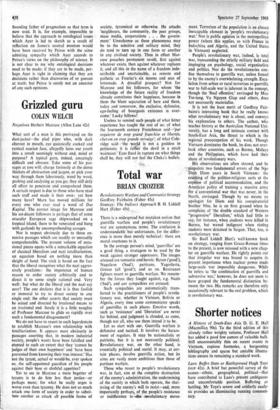Total war
BRIAN CROZIER
Revolutionary Warfare and Communist Strategy Geoffrey Fairbairn (Faber 45s)
Strategy: The Indirect Approach B. H. Liddell Hart (Faber 45s) There is a widespread but mistaken notion that guerrilla warfare and people's revolutionary war are synonymous terms. The confusion is understandable but unfortunate, for the differ- ence is more than merely technical: there are moral overtones to it.
In the average person's mind, 'guerrillas' are a good thing, a stratagem to be used by the weak against stronger oppressors. The images aroused are romantic and heroic. Byron ('good'), Napoleon (`had), partisans, Yugoslavia, Greece (all 'good); and so on. Resistance fighters resort to guerrilla warfare. We remem- ber the forces they fought against, e.g. Nazis (`bad'), and our sympathies are aroused.
Such sympathies are automatically trans- ferred to the practitioners of people's revolu- tionary war, whether in Vietnam, Bolivia or Algeria, every time some commentator speaks of guerrillas in such places. Emotive words, such as 'resistance' and 'liberation' are never far behind, and judgment is clouded, as some, though not all, who use them intend it to be.
Let us start with ABC. Guerrilla warfare is defensive and tactical. It involves the harass- ment of regulars. It may be nationalistic or patriotic, but it is not necessarily political. Revolutionary war, on the other hand, is essentially political and social It may, at cer- tain phases, involve guerrilla action, but its aims are vastly more ambitious than those of partisan warfare.
Those who resort to people's revolutionary war, in fact, aim at the complete destruction of the enemy's administration, the undermining of the society in which both operate, the shat- tering of the enemy's will to resist—and, more importantly perhaps, of the people's resistance or indifference to •athe-zsvolutionary move- ment. Terrorism of the population is an almost inescapable element in 'peoples revolutionary war.' Nor is public opinion in the metropolitan power (where this applies, as with France in Indochina and Algeria, and the United States in Vietnam) neglected.
People's revolutionary war, indeed, is total war, transcending the strictly military field and impinging on psychology, social organisation and politics. Nor do the revolutionaries con- fine themselves to guerrilla war, unless forced to by the enemy's overwhelming strength. Esca- lation from urban or rural terrorism to guerrilla war to full-scale war is inherent in the concept, though the 'final offensive,' envisaged by Mao Tse-tung, Vo Nguyen Giap and others, does not necessarily materialise.
It is not the least merit of Geoffrey Fair- bairn's interesting book that he really knows what revolutionary war is about, and conveys his explanation to others. The author, who teaches history at the Australian National Uni- versity, has a long and intimate Contact with South-East Asia, the threat to which is the regional preoccupation of his work. Though Vietnam dominates the book, he does not over- look other countries, such as Burma, Malaya and the Philippines, which have had their share of revolutionary wars.
His observations are often shrewd, and he -‘-pinpoints two fundamental errors of the Ngo Dinh Diem years in South Vietnam : the crushing of the politico-religious seas at the expense of political accommodation, and the American policy of training a massive army for a conventional war that was never, in the North, envisaged. Though by no means an apologist for Diem and his conspiratorial brother Nhu, he is on firm ground when he complains of 'the double standard of Western "progressive" liberalism,' which had little to say, for instance, when students were killed in Burma, but waxed indignant when rioting students were detained in Saigon. That, too, is revolutionary war.
Sir Basil Liddell Hart's well-known book on strategy, ranging from Greco-Roman times to the present, is now reissued with a new chap- ter on guerrilla warfare. He, rightly points out that irregular war was bound to acquire its present importance when nuclear power made large-scale war impossibly dangerous. While he refers to 'the combination of guerrilla and subversive war,' however, he does not seem to have grasped the fundamental distinction be- tween the two. His remarks are therefore only occasionally relevant to the real problem, which is revolutionary war.










































 Previous page
Previous page